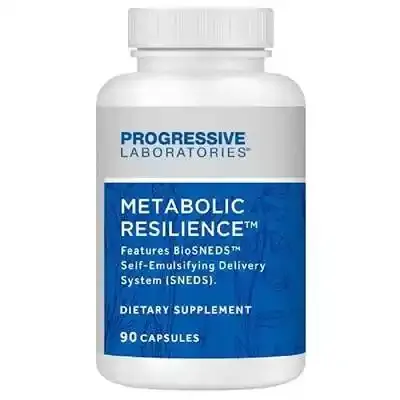Progressive Laboratories Metabolic Resilience (90 Capsules)
Progressive Laboratories Metabolic Resilience (90 Capsules)
Progressive Labs Glutezyme - Gluten & Casein Digestive Aid
Support healthy insulin sensitivity, optimize metabolism and blood sugar regulation
Progressive Labs' Metabolic Resilience™ is a professional-grade supplement formulated to support optimal metabolic health. It promotes healthy insulin sensitivity, blood sugar regulation, and antioxidative defenses. This 90-capsule formula combines five clinically supported nutrients and botanical extracts, enhanced with the BioSNEDS™ Self-Emulsifying Delivery System to maximize bioavailability and effectiveness.
Designed for healthcare practitioners aiming to improve patient outcomes efficiently, Metabolic Resilience™ offers targeted metabolic support that complements diet, exercise, and lifestyle strategies. It also helps activate anti-aging pathways, supports cardiovascular health, maintains normal lipid metabolism, and assists with daily detoxification processes.
Ideal for individuals focused on maintaining healthy blood sugar levels, enhancing metabolic function, and strengthening resilience against oxidative stress, this innovative formula helps establish a solid foundation for long-term vitality.
Key Benefits & Features:
- Supports healthy insulin sensitivity and blood sugar metabolism
- Activates anti-aging pathways and promotes cellular autophagy
- Supports cardiovascular health and normal lipid metabolism
- Enhances antioxidative status to combat oxidative stress
- Assists in daily detoxification for overall metabolic wellness
- Combines clinically studied nutrients and botanicals
- Incorporates BioSNEDS™ technology for superior nutrient absorption
- Designed to work alongside diet, exercise, and lifestyle interventions
Progressive Labs’ Metabolic Resilience™ offers a potent, bioavailable approach to supporting metabolic and overall health, providing essential tools for daily vitality and long-term wellness.
These statements have not been evaluated by the Food and Drug Administration (FDA). This product is not intended to diagnose, treat, cure, or prevent any disease. Consult your healthcare professional before starting any new exercise, supplement, or if you are pregnant or have a medical condition.fatigue.
Ingredients
| Ingredient | Amount Per Serving | % Daily Value |
|---|---|---|
| Proprietary BioSNEDS™ Blend BerberiSOL™ (enhanced absorption berberine)‚ CurcuSOL™ (enhanced absorption curcumin)‚ QuerceSOL™(enhanced absorption quercetin)‚ ResveraSOL™ (enhanced absorption resveratrol) |
179 mg | † |
| Bio-Enhanced R-Lipoic Acid | 100 mg | † |
*Daily Value not established.
How Supplied
Available in bottles of 90 capsules.
Suggested Use
As a loading phase, begin with 1 or 2 capsules 3 times a day as directed by a health care professional. After 30-60 days the dose can be lowered as directed by a health care professional.
‡ These statements have not been evaluated by the FDA. This product is not intended to diagnose, treat, cure, or prevent any disease.
Frequently Asked Questions
1. What is Progressive Labs' Metabolic Resilience™, and how does it support metabolic health?
Progressive Labs' Metabolic Resilience™ is a professional-grade dietary supplement designed to promote optimal metabolic health. It supports various aspects of metabolism, including healthy insulin sensitivity, blood sugar regulation, and antioxidative defenses. By combining clinically supported nutrients and botanical extracts, enhanced with the BioSNEDS™ Self-Emulsifying Delivery System, it maximizes nutrient absorption and effectiveness. This comprehensive formulation helps maintain balanced metabolic functions, supports cardiovascular health, activates anti-aging pathways, and aids in daily detoxification, thereby fostering overall vitality and long-term wellness.
2. What are the key ingredients in Metabolic Resilience™, and what benefits do they provide?
The ingredients in Progressive Labs' Metabolic Resilience™ offer a range of health benefits, primarily through their supportive roles in metabolic function, inflammation reduction, antioxidant activity, and cellular health:
• Proprietary BioSNEDS™ Blend
- Enhances the absorption and bioavailability of the active ingredients, ensuring maximum effectiveness of the supplement.
• BerberiSOL™ (Enhanced Absorption Berberine)
- Supports healthy blood sugar levels and insulin sensitivity.
- Promotes metabolic flexibility and may aid in weight management.
- Has anti-inflammatory and antimicrobial properties.
• CurcuSOL™ (Enhanced Absorption Curcumin)
- Provides potent anti-inflammatory effects.
- Acts as a powerful antioxidant to combat oxidative stress.
- Supports joint, liver, and cardiovascular health.
• QuerceSOL™ (Enhanced Absorption Quercetin)
- Acts as a natural antihistamine and anti-inflammatory agent.
- Supports immune function and reduces allergy symptoms.
- Provides antioxidant protection against cellular damage.
• ResveraSOL™ (Enhanced Absorption Resveratrol)
- Promotes healthy aging by activating cellular pathways like sirtuins.
- Supports cardiovascular health and healthy circulation.
- Acts as an antioxidant and anti-inflammatory agent.
• Bio-Enhanced R-Lipoic Acid
- Functions as a versatile antioxidant that supports glucose metabolism and energy production.
- Helps regenerate other antioxidants and reduces oxidative stress.
- Supports nerve health and detoxification processes.
Together, these ingredients work synergistically to optimize metabolic health, reduce inflammation, combat oxidative stress, and support overall vitality.
3. What is curcumin, and what are its general health properties?
Curcumin is a naturally occurring polyphenolic compound found in turmeric. It is known for its anti-inflammatory, antioxidant, and anti-cancer properties, making it a subject of interest for potential therapeutic applications.
4. How does curcumin affect leukemia cells?
Research indicates that curcumin can induce cell death in leukemia cells, inhibit their proliferation, and reduce their ability to invade. It can also reverse multidrug resistance (MDR) activity, which helps in overcoming resistance to conventional treatments.
5. What mechanisms does curcumin use to combat leukemia?
- Stabilizing N-CoR protein, which is important for blood cell development.
- Inhibiting signaling pathways such as NF-κB, ERK, and mTOR.
- Activating apoptosis (programmed cell death) and autophagy.
- Reducing levels of anti-apoptotic proteins like Bcl-2 and BCL-XL.
- Triggering pyroptosis by activating inflammasomes.
6. Can curcumin help in treating different types of leukemia?
Yes, studies suggest that curcumin can induce apoptosis and inhibit growth in various leukemia types, including:
- Acute lymphoblastic leukemia (Pre B-ALL and T-ALL)
- Chronic myeloid leukemia (CML)
- Acute myeloid leukemia (AML)
- Leukemic stem cells (e.g., KG-1a cells)
7. Does curcumin affect leukemia cell cycle progression?
Curcumin can arrest the cell cycle during the G0/G1 phase, preventing leukemia cells from dividing and proliferating.
8. How does curcumin influence leukemia cell migration and invasion?
Curcumin reduces the migration and invasive potential of leukemia cells by controlling specific molecular pathways, such as the HOTAIR/miR-20a-5p/WT1 axis, thereby making cells more susceptible to chemotherapy agents like Adriamycin.
9. Are there any effects of curcumin on leukemia stem cells?
Yes, in leukemic stem cell lines like KG-1a, curcumin exhibits cytotoxicity and decreases the expression of proteins (WT1 and FLT3) that are crucial for cell proliferation.
10. What are the potential benefits of using curcumin as part of leukemia treatment?
Curcumin may enhance the effectiveness of existing therapies by promoting leukemia cell apoptosis, reducing resistance, and impairing cell proliferation and invasion. It offers a promising adjunct or alternative approach for leukemia management.
11 Is curcumin a proven cure for leukemia?
Currently, curcumin is not a standalone cure but a compound with potential therapeutic benefits. It shows promise as part of combination therapies and warrants further investigation through clinical trials.
12. What is quercetin?
Quercetin is a natural bioactive flavonoid polyphenol found in many fruits, vegetables, and plants. It is renowned as one of the most effective antioxidants among polyphenols.
13. What are the main health benefits of quercetin?
Quercetin exhibits antioxidant, anti-inflammatory, anti-carcinogenic, and pro-apoptotic effects. It has been studied for its potential to treat various human malignancies, including different types of leukemia.
14. How does quercetin help in cancer treatment?
Quercetin can suppress cell growth and induce cell death (apoptosis) in cancer cells. It does this by reducing pathways like mTOR phosphorylation, regulating AMPK activity, and inhibiting signals such as Wnt/β-catenin, VEGF/Akt, and NOTCH1 gene products involved in tumor growth and survival.
15. What specific effects does quercetin have on leukemia cells?
Quercetin has been shown to reduce telomerase activity, activate apoptosis pathways (such as ATM-CHK-p53), inhibit cell proliferation, promote cell cycle arrest during the G1 phase, and induce differentiation and death in leukemia cell lines like K562, HL-60, and U-937.
15. Can quercetin reduce drug resistance in cancer cells?
Yes, quercetin can decrease drug resistance by blocking signaling pathways such as Wnt/β-catenin, which are involved in cell proliferation and resistance mechanisms.
16. Does quercetin have any effects on oxidative stress?
Yes, quercetin lowers intratumoral oxidative stress, which can contribute to its anti-cancer effects and overall cellular protection.
17. Is quercetin considered a potential therapy for leukemia?
Based on various studies, quercetin shows promise as an effective adjunct or therapy in leukemia treatment due to its ability to inhibit tumor development and promote cancer cell death.
18. Are there other health conditions where quercetin might be beneficial?
While this information primarily focuses on leukemia, quercetin's antioxidant and anti-inflammatory properties suggest potential benefits in other conditions involving oxidative stress and inflammation.
19. What is resveratrol?
Resveratrol is a naturally occurring polyphenolic compound found in various plants, known for its potent biological activities. It has been studied extensively for its anti-inflammatory, antioxidant, and anticancer properties.
20. How does resveratrol affect cancer cells?
Resveratrol can inhibit the growth and proliferation of cancer cells by inducing cell cycle arrest, promoting apoptosis (programmed cell death), and activating various cell death pathways. It triggers apoptosis through mechanisms such as phosphatidylserine externalization, caspase-3 activation, and mitochondrial pathway activation.
21. What specific effects does resveratrol have on leukemia cells?
In leukemia cells, resveratrol suppresses key signaling pathways like PI3K/AKT and mTOR, leading to reduced cell viability and increased apoptosis. It also upregulates tumor suppressor genes like PTEN and modulates proteins involved in cell survival, such as Bcl-2 and Bax, promoting cell death.
22. Can resveratrol induce autophagy?
Yes, in addition to apoptosis, resveratrol can induce autophagy—a cellular process that helps in degrading and recycling cellular components—contributing to its anticancer effects.
23. What pathways are involved in resveratrol’s anticancer activity?
Resveratrol influences multiple pathways, including the suppression of PI3K/AKT/mTOR signaling, activation of caspase enzymes, modulation of Bcl-2 family proteins, and regulation of PTEN gene expression, all of which promote cancer cell death.
24. Is resveratrol a potential chemotherapeutic agent?
Research suggests that resveratrol may serve as a promising chemotherapeutic agent, especially for leukemia, due to its ability to inhibit cell proliferation and induce apoptosis in leukemia cells.
25. Are there any other health benefits of resveratrol?
Beyond its anticancer effects, resveratrol has anti-inflammatory and antioxidant properties that may contribute to overall health, aging, and disease prevention.
26. How is resveratrol administered for health benefits?
Resveratrol is available as a dietary supplement in various forms, including capsules and powders. It is also naturally present in foods such as red grapes, red wine, and berries.

